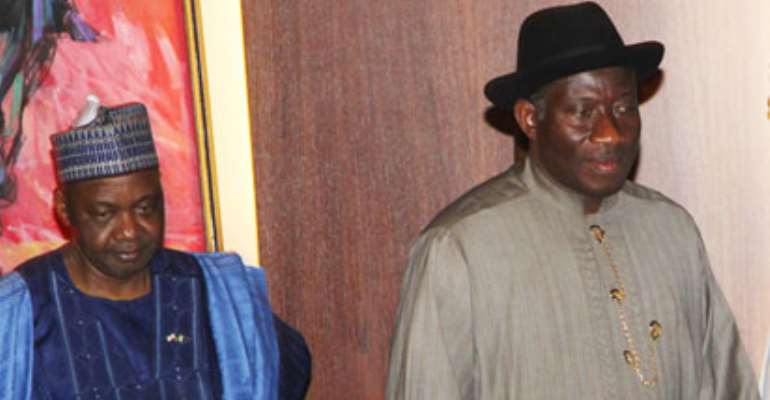REVISED 2012 BUDGET: FG PROVIDES N888BN FOR SUBSIDY

By Omoh Gabriel, Business Editor & Emma Ujah
LAGOS-The Federal Government has revised the provisions of the 2012 budget and set aside N656.3 billion as subsidy for petroleum products for the year. This was disclosed by the Minister of Finance and Coordinator of the economy Dr Okonjo-Iweala, while briefing the media on key developments around the revised 2012 budget.
The minister explained the process through which the estimated amount of subsidy for 2012 was arrived at. She stated that after 'extensive consultations with NNPC and PPPRA, the amount required for 2012 was estimated using 2008 as baseline year.
President Goodluck Jonathan with Vice President Namadi Sambo at the weekly meeting of the Federal Executive Council at the State House, Abuja. Wednesday. Photo by Abayomi Adeshida 15/02/2012
Year 2008 was used as a baseline since subsidy payments and other associated factors were fairly stable. Based on several assumptions and parameters, the amount of subsidy to be provided in 2012 is N656.30billion while the revised amount to be provided for 2011 carried over is N231.8billion.
'This means that the total projected expenditure on subsidy is N888.1billion, of which N155bn is already provided in the 2012 Budget. This has resulted in a net addition of N733.1bn. The FGN share of the projected subsidy expenditure is N374.73bn, while states and local governments will share the balance. Dr Okonjo-Iweala stated that despite many challenges, government is determined to be prudent while pursuing the best interests of Nigerians.
Explaining the decision to revise the budget she said: 'In its determination to ensure a smaller and more effective budget, the Federal Government has achieved significant reductions in the 2012 revised budget which has been transmitted to the National Assembly. The revision became necessary as a result of the need to make provision for subsidy arising from the partial deregulation under which the price of PMS was reduced from N141 per litre to N97 per litre.
'The reductions, which amount to about N100 billion, were taken from a host of areas in the budget including administrative, training, transport and other costs. Also the campaign against waste and leakages has also notched up significant success as N74 billion has been saved through biometric verification of workers and pensioners which has simultaneously led to a reduction in the pension budget while improving the processes for paying genuine pensioners. The minister explained that the 2012 Fiscal Framework earlier submitted to NASS assumed 100 per cent subsidy removal and only N155billion was provided for carryover of 2011 subsidy payments. The estimated figure for 2012 is now N888 billion inclusive of some carry-over from 2011.
Progress in spite of reduced revenue
'Following the controversy over the deregulation and government's decision to implement partial subsidy removal with PMS pump price of N97/litre and kerosene still fully subsidised, the government has faced the challenge of achieving the objectives of the budget within the context of reduced revenues. The savings made and the cuts achieved underscore the seriousness with which the Federal Government views its mandate to make a difference in the lives of the people against all odds', says the minister.
Reducing the deficit
According to her: 'At the directive of Mr. President and in line with his commitment to minimize the fiscal deficit and domestic borrowing several steps were taken to bring the deficit to a more manageable level. These include; steps taken to squeeze further resources from revenue generating agencies. IGR was increased by N53.3bn from N393.46bn to N446.78bn as a result of an ongoing engagement with these agencies. The Pension Task Force made a recovery of about N151bn of which N74bn has already been reflected in the budget. She further said: 'Cuts to aggregate expenditure were made as follows: Transfers were reduced by N25.34bn; Service Wide votes were reduced by N24.39bn from N337.08bn to N312.69bn; Overhead vote was reduced by N17.75bn made up of
This comes as a result of: Capital vote reduced by N35.53bn from N1.319 trillion to N1.284 trillion, as a result of the removal of administrative capital items such as procurement of fridges, fans, vehicles, etc.; construction of office building (except on-going projects); purchase of land and office furniture; Purchase of computers' Continuing she said 'These efforts resulted in savings of about N100billion, with aggregate expenditure coming down from N4.749trillion to N4.649trilliion.
'The fiscal deficit increases slightly from 2.77% of GDP as in the original Budget proposal to 2.97% of GDP under the revised budget. This deficit will be financed through the traditional sources such as Privatisation proceeds and Signature bonus. In line with the focus on prudence, domestic borrowing requirement is kept constant at N794.4bn. Also, the additional amount required to finance the deficit will come from the Excess Crude Account'.
